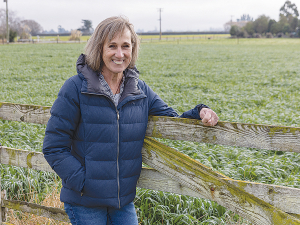LIC lifts half-year revenue on strong demand for dairy genetics
Herd improvement company LIC has posted a 5.2% lift in half-year revenue, thanks to increasing demand for genetics.
 Fernside farmer Julie Bradshaw has refined her dairy herd size by genomics while maintaining the same level of milk production.
Fernside farmer Julie Bradshaw has refined her dairy herd size by genomics while maintaining the same level of milk production.
Over the past two years, Fernside farmer Julie Bradshaw has refined her dairy herd size using genomics while maintaining the same level of milk production.
Julie has been participating in a Next Generation Farming project designed to help farmers meet tough nitrate caps while maintaining their viability. As part of this project, farmers like Julie are using innovation to demonstrate productivity and environmental benefits to their neighbours in the region and beyond.
Waimakariri Landcare Trust (WLT) and Waimakariri Irrigation Limited (WIL) have partnered with the Ministry for Primary Industries (MPI) for the project, with support from MPI’s Sustainable Food and Fibre Futures fund along with Environment Canterbury, Ballance, and DairyNZ.
The biggest change Julie has made on her farm over the last two years is closely examining her herd selection process using genomic data.
Julie has already reduced her herd size by 15 cows and is planning to remove 10 of last year’s calves based on genomic data she has received from LIC. She credits the reliability of the information with helping her to make these science-based decisions.
“The advances in the data we are getting now, and the reliability of that data means that we can be certain about which animals to keep.
“There is no point paying for grazing for animals for three or four years that that don’t end up being productive dairy cows.
“With the reductions I have made I have still retained the same level of milk production, so I know I have made the right decision.”
In the past, Julie would have retained cows with low BW (Breeding Worth) but with the possibility of reductions in the numbers of cows on farms in the future, she wants to ensure that her herd is performing at its best.
“When you look at what is happening overseas you can see that farmers have already reduced their herd numbers and it is only a matter of time before it happens here.
“It is challenging but you need to look at your entire farming operation and see what you can do to farm more efficiently. With all the science and data that we can access now it makes sense to use all the tools you have in your toolbox.”
Julie says she believes genomics and scientific innovation will play an increasingly significant role in New Zealand farming in the future.
“When I look at the data, I am getting now compared to a few years ago it is amazing. I think the data will continue to improve as more herds get involved and this will be a huge benefit to everyone involved in the farming industry.”
Julie has shared what she learned from the innovation project with local farmers and she says most of them are keen to know more about her journey and can see the benefits of using science to improve their farms.
“Farmers are supportive and willing to share what they have learned. If you are a farmer who is open to innovation and new ideas, I believe you will be able to continue to farm into the future and have a successful farming business.”
Could a breakthrough in fermentation create a new multi-million-dollar export market for shiitake mushroom extracts into China?
Meadow Fresh has created the world's first fantasy sports league powered by real cows.
This year, 'Foodie February' sees potatoes take the spotlight as one of New Zealand's most powerful and versatile food heroes.
A multi-cultural team is helping to establish one of New Zealand's largest plantings of premium eating grapes - while learning each other's languages and cultures along the way.
The World Wide Sires National All Day Breeds Best Youth Camp Best All Rounder plaudit has become family affair, with 2026 Paramount Cup winner Holly Williams following in her sister Zara's footsteps.
DairyNZ is giving New Zealand farmers a unique opportunity to gain hands-on governance and leadership experience within the dairy sector.
OPINION: Fonterra may be on the verge of selling its consumer business in New Zealand, but the co-operative is not…
OPINION: What does the birth rate in China have to do with stock trading? Just ask a2 Milk Company.